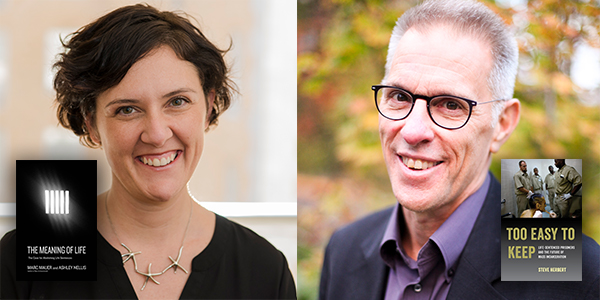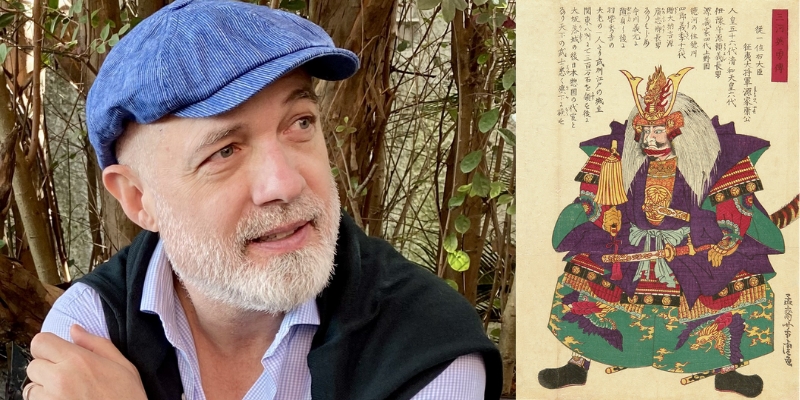Most Western democracies have few or no people serving life sentences, yet in the United States more than 200,000 people are sentenced to such prison terms. Steve Herbert, University of Washington Professor of Law, Societies, and Justice, will be on Town Hall’s stage on 12/11 with Ashley Nellis of The Sentencing Project, to discuss the flaws in a life-sentence based criminal justice system.
Herbert’s new book, Too Easy to Keep: Life-Sentenced Prisoners and the Future of Mass Incarceration, shares moving personal profiles of individuals affected by life sentences. He sat down recently with Town Hall’s Jonathan Shipley to discuss regret, redemption, and reform.
JS: What initially got you interested in the prison system?
SH: I have long been interested in the criminal justice system, although I’ve primarily focused my prior research on urban police departments. I have taught about punishment and prisons in my classes, although until 2013 I had no direct experience with prisoners. That changed when I learned that colleagues at other universities had taught courses where they brought their university students inside prisons to teach courses alongside prisoner students. I was motivated by their stories to try and replicate that at the University of Washington. It was that decision that led me down this road.
JS: What was the impetus for your new book?
SH: I started teaching at the Washington State Reformatory in 2013, and began teaching ‘mixed enrollment’ classes there in 2014. These classes combine students from UW with incarcerated students in classes taught exclusively at the Reformatory. I learned in teaching these classes that there were many people in prison for extraordinarily long periods of time who were amongst the very best students I had ever encountered in any classroom. I must confess that I did not expect this to be the case. That prompted me to learn more about life sentences, and how common they happen to be.
JS: What preconceived notions/prejudices did you have going into interviewing lifers? How did that change after talking to them?
SH: I had enough familiarity with life-sentenced prisoners that I expected them to be thoughtful and interesting. I don’t believe that they necessarily challenged any stereotypes I had. The process of stereotype destruction had already occurred when I started teaching inside.
JS: What are some of the greatest lessons you’ve learned from lifers?
SH: I think the most significant lesson is that so many of them are deeply regretful about their past transgressions, and that they try as hard as they can, under limiting circumstances, to engage in some form of atonement. I could not help but be impressed by their resilience, and the strength more generally of the human spirit.
JS: Rehabilitative incarceration—is that something you believe in? How can we make it a reality?
SH: There is no question that many, many prisoners are hungry for opportunities for self-improvement. Efforts to respond to this desire for positive change bring benefits to everyone, both inside and outside of prisons. For that reason, they should be supported. In my observation, many impactful programs are those that are run by volunteers from the outside. For example, my teaching inside could only have occurred due to a partnership with University Beyond Bars, which works to provide college preparatory and college level courses for prisoners. In Washington State, at least, efforts to make it as easy as possible for these outside organizations to do their work can only pay dividends for all involved.
JS: Do lifers have a desire for redemption? In what ways? How, if at all, does this help them in their day-to-day lives in jail?
SH: I cannot speak for every lifer, but there are clearly very many of them that earnestly seek redemption. They manifest this desire in myriad ways, but most notably by trying to be mentors to the younger prisoners in their midst. They try to help these prisoners redirect their lives so that they do not reoffend and thus return to prison. They also try to work a job, to educate themselves, and to involve themselves in various prisoner-run organizations. These activities help provide structure and meaning to their lives, and help them lessen the day-to-day pains of imprisonment.
JS: What are some more poignant stories you have in regards to your interviews with lifers?
SH: One inmate told me a story about how he participated in a dog program at his institution. He described how terrific he felt when he first met the dog, and interacted with it in his cell. He said that it was the first time he had ever been asked to care for another sentient being, and that it was a terrific feeling. He told this story as he was describing his general maturation. This was a consistent theme across many of my interviews. Many of the prisoners, especially those who got their sentences while they were young, discussed how their maturation led them to be more concerned for others, and how this shift was really critical to their more general projects of self-improvement and atonement. Said one prisoner, ‘When I committed my crime, I didn’t think about the consequences or who I was hurting or anything like that. I just wanted some money. So, I didn’t really think about that kind of stuff. It was just all about me. Me, me, me. But then I realized it really wasn’t about me, and change started happening.’
JS: What fixes would you propose for life sentencing?
SH: The best route forward is to change sentencing policy. Life sentences are too commonly invoked, so a shift in punishment policy is a smart move. This can happen in a number of ways, but a key one is to make parole more widely available. Like many states, Washington no longer allows parole for most prisoners; they all serve fixed sentences. This means that many prisoners who undergo profound change cannot have that reality recognized in a reduced sentence. That, in my view, is a key policy that deserves reconsideration.
JS: Can the public do anything to improve the lives of lifers? In what ways?
SH: I think the public can lessen the distance between themselves and prisoners. The best way to do this is to find a volunteer program for which they can work. Regular encounters with those who are incarcerated will work to dispel the stereotypes that are commonly held. They can also lobby their legislators to shift punishment policy.
Don’t miss Steve Herbert with Ashley Nellis and Katherine Beckett on 12/11 at Pigott Auditorium at Seattle University.



